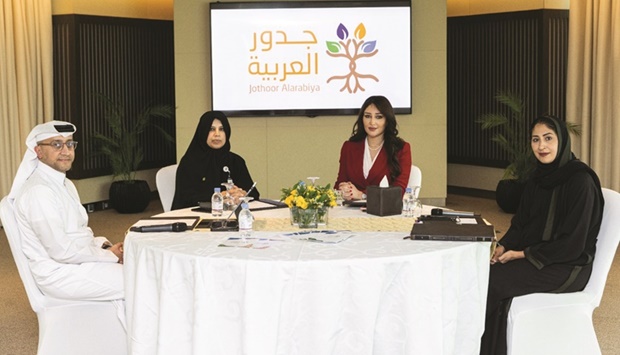In celebration of International Mother Language Day, Nayef Mohamed al-Ibrahim, a Qatari entrepreneur and CEO and founding partner of Ibtechar, took part in a panel discussion that covered such topics as the role of language in preserving identity, the importance of Arabicisation in modern sciences, how to practically support the Arabic language, and the role of organisations in promoting the use of Arabic.
The guest speakers were Aysha al-Mudakha (director, Strategic Initiative Partnership Development, Qatar Foundation), Maryam Yasin al-Hammadi, director, Culture and Arts Administration, Ministry of Culture; director-general of the Qatari Forum for Authors, and representative of Qatar at the meeting of the Intergovernmental Committee for the Protection and Promotion of the Diversity of Cultural Expressions); and Amal Arab (media personality, TV presenter).
International Mother Language Day is aimed to promote awareness of linguistic/cultural diversity and multilingualism. Marked on February 21, it was first announced by the United Nations Educational, Scientific, and Cultural Organisation (Unesco) in 1999, as a way to promote peace, tolerance, understanding, and protection of all mother tongues of the world. Then, it was formally recognised by the United Nations General Assembly under UN resolution 56/262.
In a statement, al-Ibrahim said, “I have a special interest in education, particularly the Arabic language. Realising the challenges facing Arabic, we at Ibtechar felt the need to develop an innovative Arabic teaching programme, through which we can build the Arabic capacity among school children step by step, including all the four main skills: reading, writing, listening, and speaking. To that end, we launched two years ago the Jothoor Alarabiya, a programme that provides a personalized learning experience, starting from enhancing the child’s knowledge of Arabic letters, by constructing sentences, paragraphs, and whole essays”.
Jothoor Alarabiya equips the students with a comprehensive knowledge of modern standard Arabic (MSA), from the alphabet to composition of simple pieces of writing. Its aim is to improve the students’ knowledge of Arabic, with applied reading, writing, listening, and speaking exercises. Special focus is given to self-learning, task phasing, extensive practice, and spaced repetition to ensure gradual comprehension of Arabic.
The programme’s underlying presumption is that Arabic is a key component of an Arab society. For Arabic speakers, it is the system of communication and identity. Several mechanisms are taken into consideration, notably respecting individual differences and each student’s ability to develop, urging the students to deeply research into linguistics, introducing them to the four skills of language, telling them to use MSA instead of colloquialism, correcting common errors, enlarging their vocabulary, and encouraging them to do their homework on their own.
Jothoor Alarabiya is one of Ibtechar’s innovative programmes to support the educational and cultural sectors in Qatar. The company pays great attention to this work, as a cornerstone of the knowledge-based society sought by Qatar National Vision 2030.
International Mother Language Day is aimed to promote awareness of linguistic/cultural diversity and multilingualism. Marked on February 21, it was first announced by the United Nations Educational, Scientific, and Cultural Organisation (Unesco) in 1999, as a way to promote peace, tolerance, understanding, and protection of all mother tongues of the world. Then, it was formally recognised by the United Nations General Assembly under UN resolution 56/262.
In a statement, al-Ibrahim said, “I have a special interest in education, particularly the Arabic language. Realising the challenges facing Arabic, we at Ibtechar felt the need to develop an innovative Arabic teaching programme, through which we can build the Arabic capacity among school children step by step, including all the four main skills: reading, writing, listening, and speaking. To that end, we launched two years ago the Jothoor Alarabiya, a programme that provides a personalized learning experience, starting from enhancing the child’s knowledge of Arabic letters, by constructing sentences, paragraphs, and whole essays”.
Jothoor Alarabiya equips the students with a comprehensive knowledge of modern standard Arabic (MSA), from the alphabet to composition of simple pieces of writing. Its aim is to improve the students’ knowledge of Arabic, with applied reading, writing, listening, and speaking exercises. Special focus is given to self-learning, task phasing, extensive practice, and spaced repetition to ensure gradual comprehension of Arabic.
The programme’s underlying presumption is that Arabic is a key component of an Arab society. For Arabic speakers, it is the system of communication and identity. Several mechanisms are taken into consideration, notably respecting individual differences and each student’s ability to develop, urging the students to deeply research into linguistics, introducing them to the four skills of language, telling them to use MSA instead of colloquialism, correcting common errors, enlarging their vocabulary, and encouraging them to do their homework on their own.
Jothoor Alarabiya is one of Ibtechar’s innovative programmes to support the educational and cultural sectors in Qatar. The company pays great attention to this work, as a cornerstone of the knowledge-based society sought by Qatar National Vision 2030.

